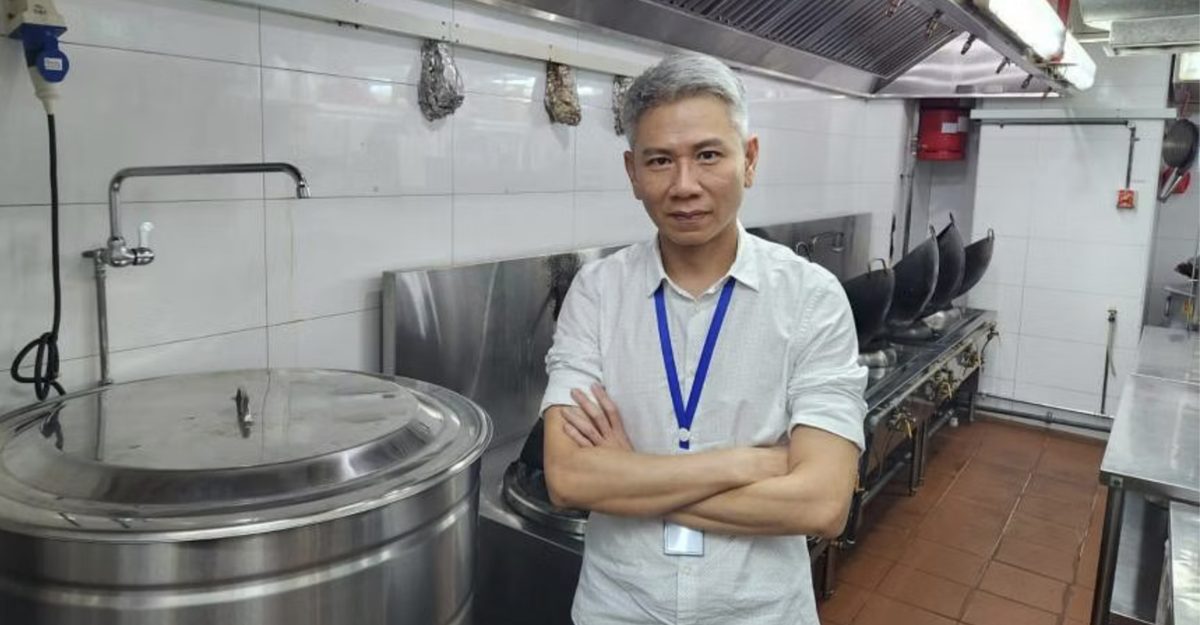

Shop
See the latest and follow us
Support
Service Hours: 9am to 6pm

Photo credit by OCBC
A recent article in The Straits Times highlighted how the OCBC Business app helped RichFood Catering, a catering company, experience a significant increase in sales. After using the app to track their monthly spending, sales, and cash flow, the owner, Nigel Kok, spotted a sudden surge in orders. He promptly increased the marketing budget for the popular menu, resulting in a remarkable 25% boost in sales.
The OCBC Business app offers comprehensive insights into a company’s finances, including alerts on foreign currency rates and incoming funds. This information helps SME owners like Mr. Kok make informed business decisions. With its user-friendly interface and real-time data, the app helps SMEs navigate the competitive F&B industry and streamline their operations.

We believe it is essential to have a confinement recommendation for new moms to help make those first few weeks easier.
Becoming a new mom is a life-changing experience that can be both exciting and overwhelming.
The first six weeks after giving birth are particularly challenging as you adjust to your new role and care for your newborn.
Our earnest request to you as a new mom, take care of yourself as well as your newborn during those first few weeks.
In this blog post, we’ll give ideas and confinement techniques for new parents to help make those first six weeks feel less difficult.

One of the most important things you can do in the first six weeks is to accept help from others.
This could mean having family members or friends come over to help with chores or taking care of your baby while you rest. Don’t be afraid to ask for help when needed, and try to prioritise self-care as much as possible.
It’s completely normal to feel overwhelmed as a new parent, and accepting help can make a huge difference in your overall well-being.
You can consider seeking help from a lactation consultant or postpartum helper/doula for support with breastfeeding or emotional well-being in addition to household tasks.
Always remember that self-care is not selfish, but rather essential for your own health and your baby’s health.
Here are a few tips to prioritise self-care in those first few weeks:

Speaking of self-care, getting enough rest is crucial during the first six weeks. Newborns require round-the-clock care but try to nap when your baby naps and take advantage of any opportunities to get some extra sleep.
If possible, ask your partner or a family member to help with nighttime feedings, so you can get a longer stretch of sleep.
Apart from obtaining adequate sleep, there are several additional self-care routines that might be beneficial. Consider the following suggestions:

Being a new mom can be stressful, and you may be concerned about your own recovery as well as your baby’s health and growth.
You should not be afraid to seek assistance and resources from your healthcare professional. Additionally, there are many other resources available that can provide valuable support.
Some option includes:
Postpartum depression and anxiety are common among new moms, so it’s important to prioritise your mental health during the first six weeks.
This could mean talking to a therapist, joining a support group, or simply making time for activities that help you feel relaxed and happy.

Breastfeeding is a wonderful way to bond with your baby, but it can also come with challenges. Many new moms experience sore nipples, difficulty latching, and other issues. Be prepared by taking a breastfeeding class, talking to a lactation consultant, and having nursing supplies like nipple cream and breast pads on hand.
Breastfeeding is an important aspect of nurturing your newborn, and while it can be rewarding, it can also be a challenging experience. Here are some additional tips that may be helpful:
Practice proper positioning: Ensuring that your baby is positioned correctly during breastfeeding can make all the difference. Make sure your baby’s entire body is facing you, and their head and body are aligned. This can help prevent sore nipples and other issues.
Take breaks: Breastfeeding can be tiring for both you and your baby, so it’s important to take breaks when needed. If your baby falls asleep during feeding, gently detach them and allow them to rest. You can resume feeding once they wake up.
Stay hydrated: Drinking plenty of fluids is important for milk production and your overall health. Aim to drink at least 8-10 glasses of water per day.
Don’t be afraid to ask for help: If you’re struggling with breastfeeding, don’t hesitate to reach out to a lactation consultant or other healthcare provider for assistance. They can provide guidance and support.

In the first six weeks, you’ll be going through a lot of diapers, wipes, and other baby essentials. Stock up ahead of time so you don’t have to worry about running out.
Consider setting up a diaper changing station in your home with all the supplies you need to reach within. For new parents, it’s vital to expect the number of diapers and wipes that a newborn will require during the initial weeks.
Here are some additional tips to help make the diapering process go smoothly:
Choose a diaper brand that fits your baby’s size and needs. Some babies may have sensitive skin and require hypoallergenic diapers.
Have a designated diaper pail to dispose of dirty diapers. This will help keep your home smelling fresh and clean.
Invest in a portable changing pad for diaper changes on-the-go. This can be useful for outings or visits to friends and family.
Keep a spare set of clothes nearby during diaper changes in case of any accidents.
Don’t forget to wash your hands before and after each diaper change to prevent the spread of germs.
By preparing ahead of time and having all the necessary supplies within reach, diaper changes can become a routine task that you’ll feel confident and comfortable doing.

It’s important to keep in mind that being a new mom can come with a lot of unexpected challenges. It’s completely normal to feel like you’re struggling at times, and it’s okay to reach out for help when you need it.
Consider joining a new mom’s support group, talking to your healthcare provider, or connecting with other moms in your community. Remember that self-care is also important during this time, so try to take breaks when you can and prioritise activities that help you relax and recharge.
Above all, know that you are not alone and that there is no right or wrong way to navigate motherhood. Trust your instincts and do what feels best for you and your baby.
Final words
In conclusion, the first six weeks after giving birth can be challenging for new moms, but there are steps you can take to make it a little bit easier.
Accepting help from others, getting enough rest, asking your healthcare provider questions, prioritizing your mental health, preparing for breastfeeding challenges, stocking up on baby essentials, and giving yourself grace are all important things to keep in mind.
Remember, you’ve got this!
We hope this article has provided some insight. If you wish to try out our confinement meals do speak with us today to find out more about our confinement food packages!

Bringing a new life into the world can be one of life’s most happy and fulfilling moments. Yet, new parents should be aware that the postpartum period can bring a range of feelings that can seem overwhelming. The emotional ups and downs that occur during this period are normal, and it is critical to understand how to navigate them in order to achieve the best possible outcomes for both the new parent and the newborn. According to statistics states approximately 1 in 10 women will experience postpartum depression after giving birth. The studies also estimate that there were around 50% of mothers suffering from postpartum depression are not diagnosed by professional healthcare. In this article, we’ll look at the emotional changes that new parents may go through during the postpartum period and give ways for dealing with them.
Symptoms after childbirth
While postpartum emotional changes are common and normal, they can be overwhelming and challenging for some. Most new mums will experience “baby blues” after giving birth with usually includes anxiety, mood swings, crying spells and difficulties of sleep. Normally baby blues will appear after 2-3 days after giving birth and may last up to 2 weeks. The heavier symptoms of “baby blues” are known as postpartum depression and usually, this condition will exhibit mostly in new mums. While it is vital to emphasize that postpartum depression is not a character flaw or a weakness, it is important to accept it as a condition following childbirth.

Coping Strategies for Postpartum Emotions
There are coping strategies you can employ to help you through this transition and make your postpartum experience as smooth and enjoyable as possible.

Myth and Misconceptions About Postpartum Emotional Challenge
Postpartum emotional challenge, also known as postpartum depression (PPD), is a serious mental health condition that affects some parents after the birth of a baby. It can cause feelings of sadness, anxiety, guilt, hopelessness, and difficulty bonding with the baby. There are many myths and misconceptions about PPD that can prevent people from seeking help or getting proper treatment. Here are some of them:
In conclusion, navigating the emotional ups and downs of postpartum can be challenging, but it’s important to remember that you are not alone in this experience. Practising self-care and self-compassion, seeking support, maintaining healthy relationships, getting professional help, and asking for assistance with maternity meal planning are all helpful coping strategies that can make this transition smoother and more enjoyable.
As a new mom, you may feel overwhelmed at times, but it’s important to prioritize your mental and emotional well-being. Remember that taking care of yourself is not selfish, it’s necessary. You are a strong and capable mom, and with the right support and coping strategies, you can navigate the postpartum period with grace and ease.
Don’t be afraid to reach out for help when you need it, and don’t hesitate to prioritize your own needs alongside those of your new baby. With time, patience, and perseverance, you will find your footing and thrive as a new mom. Congratulations on this exciting new chapter in your life, and know that you’ve got this!
Final words
We hope this article has provided some insight on how to Navigating Emotional Ups and Downs of Postpartum. If you wish to try out our confinement meals do speak with us today to find out more about our confinement food packages!

Being a new mother is both an exciting and daunting experience. The physical and emotional hardships of postpartum recovery accompany the joy of welcoming your infant into the world. Understanding postpartum preparation can be beneficial to you as giving birth will be super challenging for a new mum.
In this writing, we will discuss the significance of self-care during postpartum recovery and provide new mothers tips on how to care for themselves physically and mentally. We will discuss everything from enough relaxation and sleep to a good diet and self-care. Additionally we will also share the need of seeking assistance and support from family, friends, and medical experts.
We want to assist new mothers in taking care of themselves and making a smooth transition into parenting. So let’s discover how to navigate postpartum with self-care!
Rest and recover
Rest and recuperation are crucial postpartum healing components. Your body has undergone much throughout pregnancy and delivery, and it needs enough rest and restoration.
Building a healthy routine such as doing specific exercises such as pelvic tilt, kegel exercise, and happy baby yoga pose is recommended if your health care provider has given the green light.
There will be when you need others to assist you throughout your postpartum period, so it is always a good choice to get assistance from your family members or a postpartum doula. In addition, it is crucial to arrange a time for rest and sleep throughout the day. For instance, napping while the infant sleeps or spending a few moments relaxing.
New moms should avoid lifting heavy things and participating in intense activity until approved by their doctor.
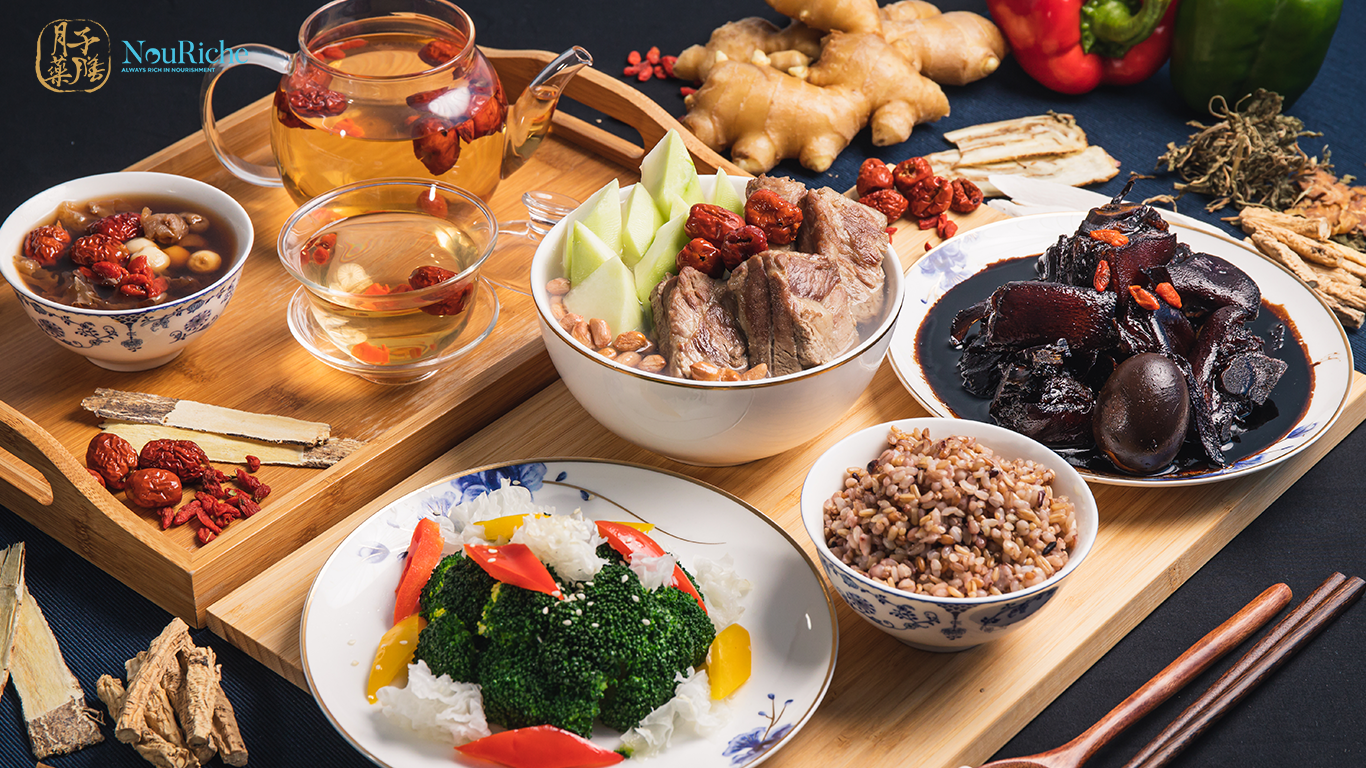
Healthy Diet
Dietary balance is crucial for postpartum healing. Your body needs appropriate nutrition to mend and recover after labour and, if desired, to support breastfeeding. So having to focus on getting foods high in nutrients, like fruits, vegetables, lean meats, whole grains, and healthy fats is recommended for your recovery.
According to the dietary recommendations, food such as vitamins and minerals, like iron, calcium, and vitamin D, will help to supply you with the needed nutrients that will help your body recover to your pink of health.
Confinement meals are particularly beneficial for postpartum recovery usually includes:
Before deciding on your postpartum meal plan, we advise you to know your food restrictions or allergies you may have and to speak with your healthcare provider if you have any concerns about your diet. Alternatively, you may seek for maternity food consultation from us and we will do our best to delivery your meal accordingly.
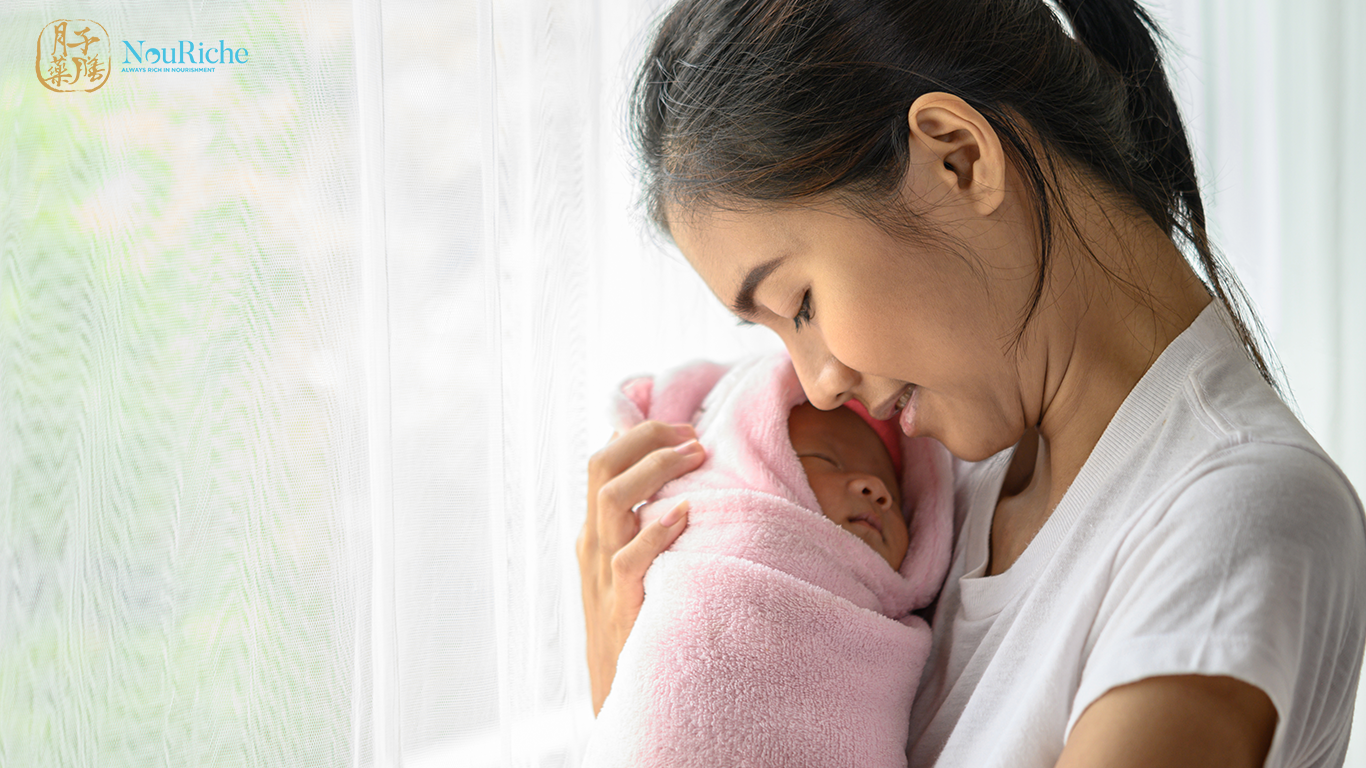
Seek Help & Care for Mental Health
A woman may require several kinds of assistance during postpartum recovery, based on her particular requirements and circumstances. Some common types of help that may be needed include:
Rest assured, it is very normal for postpartum mum to ask for help whether it is from your friend or family members whenever you needed it. Additionally, don’t be shy to reach out to any postpartum support group whether it is from social media or your closest circle.
Dealing with postpartum might be tough for many new mothers but it is important to remember that experiencing such difficulties and challenges is nothing to be ashamed of. It is very common for the majority of women will experience a roller coaster of emotions while in the postpartum period. To ease up, we suggest asking out for support from others be it in a form of communication or physical help. Be proud of yourself as a new mom, a new you.
Conclusion
We hope this article has provided some insight on how to navigate yourself during your postpartum journey. If you wish to try out our confinement meals do speak with us today to find out more about our confinement food packages!

You are tired and fatigue surrounds you. You want something to alleviate your pain after giving birth. This is where postpartum massage comes in.
You might be wondering what exactly postnatal massage is. To put it simply, it’s a specific type of post-pregnancy massage you should get after giving birth. The typical benefits you’ve received from it are meant to provide both mental relaxation and other benefits. Continue reading to learn how postpartum massage can help you and what to expect.
The definition of postpartum massage may sound like generic massage terms but receiving one can make a difference to your body, light up the good mood within you and speed up your healing as well.
The very basic foundation of a postpartum massage is often associated with a regular body massage. Generally, postpartum massage is safe for every mother out there. A woman who receives a body massage after giving birth is highly likely to notice differences before and after the massage session be on their mood or their body.
If you are wondering whether the massage is safe to perform on a mother who went for cesarean delivery – well our best advice is to seek consultations from your doctor and massage therapist on what works best for your body. Usually, the therapist will advise you not to proceed with the massage if you had surgery in the last 6 weeks.
If you were experiencing a blood clot during your pregnancy, it was highly likely that your doctor advised you not to proceed with the massage. Hence, before making an appointment with the massage therapist, it is best to get a consultation from your doctor to determine whether it is safe to proceed or not.

Below are the general benefits of postpartum massage:
When the general idea of getting a massage is to reduce pain, stress, muscle relaxation and flushing out the toxins, mothers will benefit more from this. As such:

TCM massage is an abbreviation of Traditional Chinese Medicine massage. Acupoint methods and herbs are mixed in this post-pregnancy massage to ease muscular tension and improve blood flow. The treatment includes a massage, a belly band, and food recommendations.
Jamu postnatal massage originated in Southeast Asia and is named after a herbal concoction used during the massage. This combination is good for new mothers because it comprises all-natural ingredients with medicinal properties. The massage also involves head and breast massages to help with migraines and lactation. The massage also includes a Jamu wrap, in which the mother’s stomach is wrapped in fabric from the ribs to the hips to tone the abdominal skin and realign the spine.
Swedish massages are particularly beneficial for new mothers. This style of massage employs long strokes and kneading to tone the muscles and relieve tension. The vigorous strokes of this postnatal massage promote blood circulation and muscle contraction, which aids in the elimination of toxins.
Conclusion
We’ve known for a long time that human touch can be powerful, and postpartum massage uses the benefits of touch to help women heal after giving birth.
There are many good things about getting a massage after giving birth. They can help control hormones, produce more milk, and reduce swelling. Since postpartum massage is important, you might not want to skip it. Having one massage is sufficient for the first 12 weeks after giving birth. Nevertheless, check with your doctor or healthcare professional before you start a massage therapy routine to make sure your body is healthy enough.
How often you get a massage is up to you and will depend on your budget, how occupied you are, and your preferences. There isn’t one right answer. You could also ask your partner to massage you at home. No matter how you choose to use massage to heal after giving birth, the benefits will help you get used to your new life with your baby.
We hope this article has provided some insight into the postnatal massage that you should incorporate into your postpartum confinement period. Additionally, to get the maximum benefits after the postpartum massage, we highly suggest you try out our Regular Confinement Trial Meal – available for both lunch and dinner for $36.00.
We aim to provide the best confinement catering services in Singapore and to provide support to new mothers with the key nutrients they need for an effective and speedy recovery. Speak with us today to find out more about our confinement food packages!

Eating well throughout your pregnancy is one of the best things you can do for yourself and your baby. Meeting the recommended nutritional requirements is especially crucial during the third trimester for sufficient energy while providing all necessary nutrients to your growing child. However, knowing what to eat or avoid when you’re pregnant is also important.
NouRiche is a leading provider of confinement meal deliveries in Singapore, and here’s the lowdown on the foods to eat and avoid during the final leg of your pregnancy.
#1 Foods rich in iron
Insufficient consumption of iron may lead to anaemia. This is because during pregnancy, blood volume expands to accommodate the changes in one’s body. Additionally, your unborn baby will need to store adequate iron for the first six months of life before he or she starts taking in solid foods.
Choose iron-rich foods such as meat, chicken, fish, eggs, dried beans and fortified grains. The form of iron in meat products, called heme iron, is more easily absorbed than the iron in vegetables. For those who are anaemic, increasing meat consumption will be the easiest way to increase the iron your body receives.
#2 Foods rich in protein
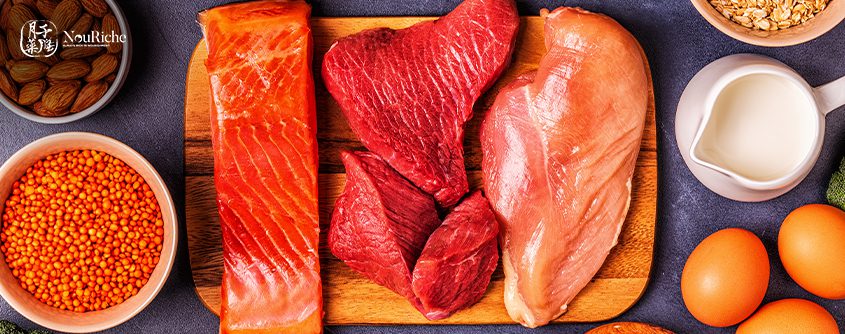
Protein is crucial for your baby’s development throughout pregnancy and helps your baby’s body produce blood. Good sources of protein are lean meat, poultry, seafood and eggs, while vegetarian options include beans and peas, nuts, seeds, and soy products.
#3 Foods rich in DHA
DHA-rich foods can help with growth of a baby’s brain. Pregnant women require about 200 milligrams of DHA (docosahexaenoic acid) daily. To meet these requirements, consider including milk, eggs, and fruits in your confinement food.
Learn more: Confinement Food Singapore | How It Nourishes Your Body
#4 Folic acid
Folate is a B vitamin that prevents problems with the developing brain and spinal cord. The synthetic form of folate found in supplements and fortified foods is known as folic acid, and has been shown to decrease the risk of premature birth on top of having a low birth weight baby. Get your sources of naturally occurring folate from dark green, leafy vegetables, citrus fruits, and dried beans, peas and lentils.
#5 Calcium
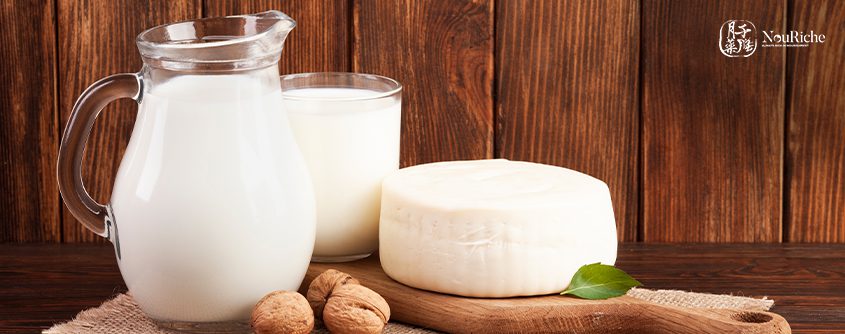
Both mother and baby require calcium for strong bones and teeth. Additionally, calcium supports healthy functioning of the circulatory, muscular and nervous systems. Dairy products are great sources of calcium, while non dairy options include broccoli and kale.
#6 Foods that are high in Vitamin C, B6 and B12
Vitamins C, B6 and B12 play a vital role in the development of a baby through the musculature and placental growth. These nutrients can be found in foods such as oranges, bananas, sweet lime, carrots, chickpeas, and almonds.
#7 Magnesium
Magnesium plays an important role in nerve and muscle function, on top of maintaining normal blood pressure. In addition, it helps your baby develop strong teeth and bones. Getting adequate magnesium during pregnancy has also shown to prevent preterm labour and other pregnancy complications. Go for foods like green leafy vegetables, bananas, legumes, avocados, dark chocolate, or raw unsalted nuts.
#1 Avoid raw meats and vegetables
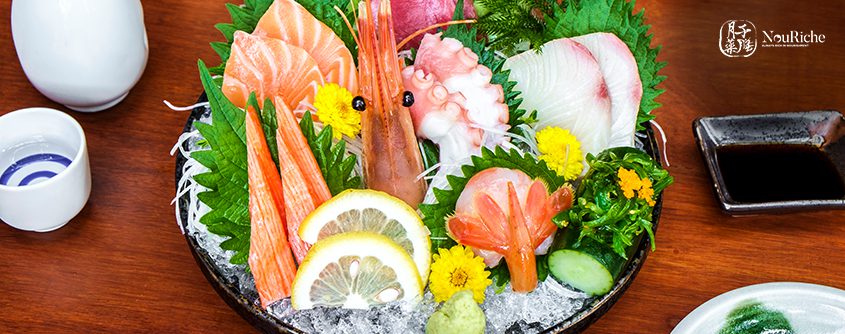
Avoid raw meats and vegetables of any kind as such foods contain a variety of food-borne bacteria and viruses. Changes in your metabolism and circulation during pregnancy may increase the risk of bacterial food poisoning, and could result in more severe issues than if you were not pregnant.
#2 Spicy foods
Spicy foods can lead to indigestion and heartburn during pregnancy, and therefore should be avoided during the last trimester.
#3 Foods high in salt
High salt intake can lead to several concerns such as water retention or swelling of the legs for pregnant women. The issue of high blood pressure may also come up, causing potential health issues for the baby.
Preparing your own confinement meals during this period can be inconvenient and time-consuming. Hence, it’s best to engage a reliable confinement food caterer for nutritious pregnancy meal deliveries to boost your health and vitality. Apart from being guided by a professional dietitian to assist with your recovery, you can rest assured that your confinement food is not just nutritious, but delicious too.
We hope this article has been beneficial in ensuring you and your baby are getting all the nutrition you need as you head into the final stages of your pregnancy.
Confinement meal delivery services have been gaining popularity among new mothers for its convenience. Searching for confinement meal deliveries? NouRiche takes pride in providing nutritious and tasty meals that all mothers are sure to enjoy. Reach out to our team today to find out more!

Achieving a healthy weight post-childbirth can be a struggle for many new mothers. It can be stressful taking care of a newborn, adjusting to a new routine, and recovering at the same time. However, it’s crucial to return to a healthy weight after delivery, especially if you plan on becoming pregnant again in the future. Going into a future pregnancy at a higher weight can put both the mother and the developing baby at risk of medical complications, such as gestational diabetes and hypertension. But what do you have to do to lose that postpartum weight?
NouRiche is a leading provider of confinement meal deliveries, and we share some ways for an effective postpartum weight loss.
Don’t crash diet
Crash diets are very low calorie diets designed to make you lose a large amount of weight in the shortest amount of time possible. That said, those who do so usually end up feeling lethargic and gaining back the weight at some point.
After delivering a baby, your body requires good nutrition to heal and recover. In addition, if you are breastfeeding, you would need even more calories than usual. A low-calorie diet usually lacks important nutrients. Your postnatal nutrition plan should instead include healthy, well-balanced home-cooked confinement foods that are rich in various nutrients crucial in helping you lose weight post labour.
Avoid unhealthy snacks
The foods you have around can play a big part in what you snack on in between meals. And when you’re searching around for something to munch on, a healthy alternative could just be the ticket. By stocking up on healthy snacks, you can ensure you always have something close at hand when the mood strikes without compromising on nutrition.
Keep your goals realistic
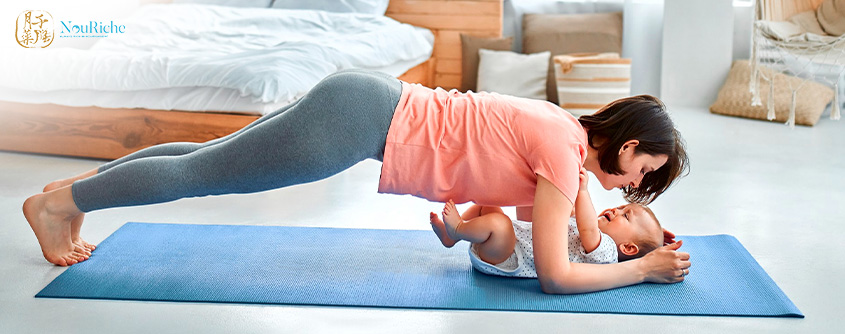
Despite what magazines and celebrity stories would have you believe, losing weight after a pregnancy may take some time. Your body needs to recover from childbirth. On the contrary, losing weight too soon after can take longer for you to lose the postpartum weight. Keep your goals about your new body realistic. With a good confinement meal plan and exercise, you should be able to achieve any healthy level of weight loss that even your doctor will give the thumbs up to.
Eat healthy confinement meals
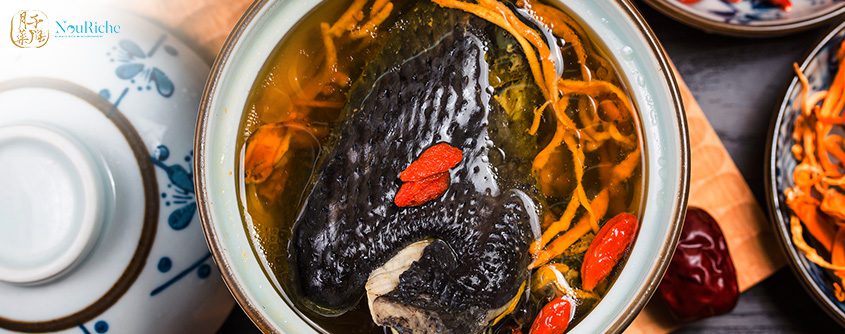
One crucial aspect that can show significant effects in shaping your figure and bringing it back to a pre-pregnancy state is through nutrition management. Perhaps you may find yourself being overwhelmed with information on the do’s and don’ts of confinement food. If so, consider confinement meal deliveries or confinement soup packages from a reliable confinement food caterer such as NouRiche for added convenience and peace of mind.
Learn more: 4 Ways Soup Can Help During Your Confinement Period | NouRiche
The best and most achievable way to lose weight after giving birth is through a healthy diet, breastfeeding, and exercise. We hope this article has provided some insight on how you can do so without compromising the health of your body.
Searching for the right confinement food doesn’t have to be difficult. NouRiche is a leader of confinement meal deliveries in Singapore that places emphasis on ensuring a well-balanced diet for the full recovery of new mothers post-delivery. Reach out to our team today to find out about our confinement meal services today!
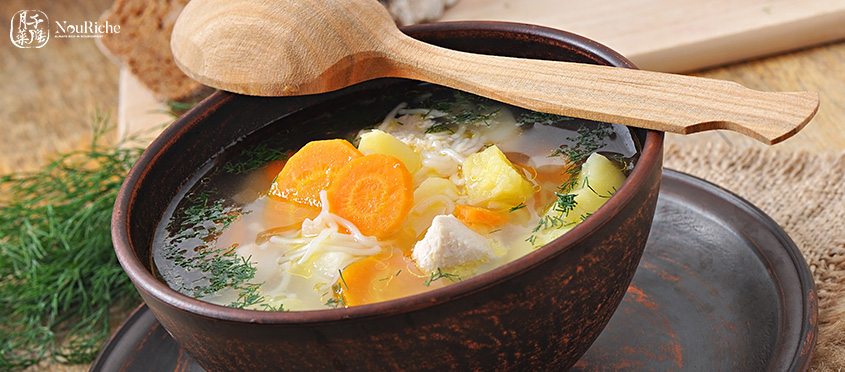
Meat is traditionally viewed as a vital component of postpartum confinement meals in Singapore. This is because meat is believed to come with warming characteristics in TCM, and is often used with the aim of nourishing and rebalancing the mother’s body. But with vegetarian diets increasingly gaining traction for health, ethical, and environmental reasons, many have started to reduce their reliance on daily consumption of animal products. How then, can vegetarian mothers still gain the necessary nutrition without compromising on their choice of diet? We’ve put together this list of foods that vegetarian mothers can consume to ensure they don’t miss out on essential nutrients during their confinement.
Ginger
Ginger is one of the most commonly seen ingredients in the preparation of confinement meals. Known for its anti-inflammatory properties, it is often used for clearing phlegm, stopping coughs, and the detoxification benefits it comes with. That said, the main reason it is included in so many confinement meal deliveries is its warming elements.
TCM believes that the elements that cause a new mother’s body temperature to drop are harmful. Hence, ginger is used to keep the body warm, eliminating ‘wind’, and preventing ailments such as rheumatism and body aches in the future.
Carrots
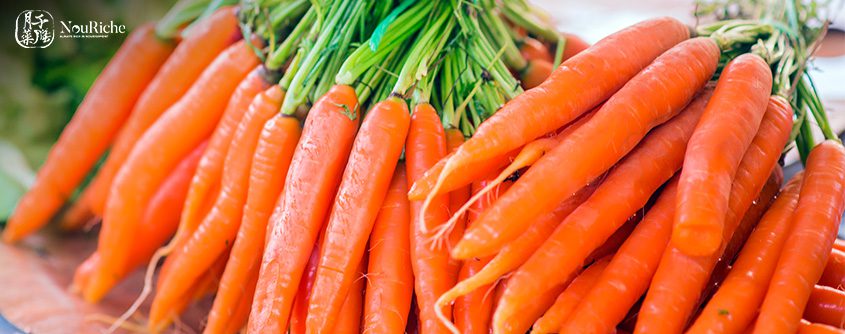
Carrots are high in fibre which can help to prevent constipation in new mothers after delivery. In addition, they are also rich in beta-carotene which helps to boost the immune system.
Lotus roots
Lotus root is a rich source of polyphenolic compounds that come with many health benefits ranging from antioxidative to anti-inflammatory properties. Lotus root soup is usually given to new mothers for its high levels of nutrition, on top of keeping the bodies of new mothers warm. Add some papayas into lotus root soup as a natural sweetener, and to boost milk production for breastfeeding mothers.
Learn more: 4 Ways Soups Can Help During Your Confinement Period
King oyster mushroom
King oyster mushrooms aren’t just delicious, they are packed full of health-supporting benefits, such as naturally occurring antioxidants. King oyster mushrooms contain high levels of ergothioneine, an antioxidant found in the mushroom’s mycelium and fruit bodies that help reduce damage from free radicals and oxidative stress. These superfoods have also been shown to lower cholesterol and help with weight loss.
Tofu and soybeans
Tofu is essential for the body’s tissues and cells to heal, which is necessary for a mother’s recovery following childbirth. Adequate protein intake supports the immune system by building antibodies and prevents loss of muscle mass for breastfeeding mothers.
Iron and copper, which are the two minerals important for red blood cell formation to replenish lost blood after delivery, are also found in soybeans. Additionally, soybeans contain omega-3 fatty acids which are beneficial for the brain development of babies.
Black beans
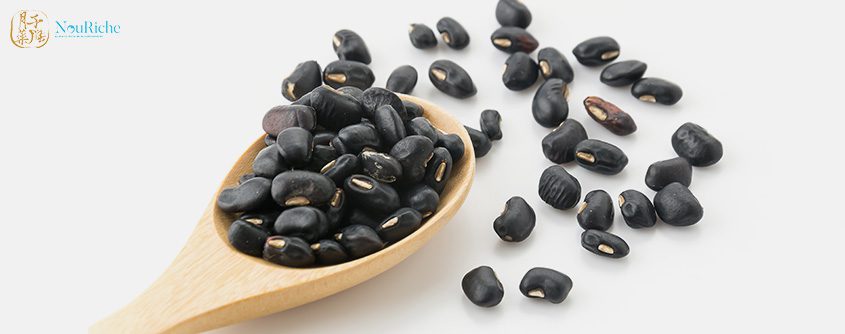
New mothers are often at risk of anaemia and other complications related to the blood loss that occurs with the delivery of a baby. Therefore, it is important for meals to contain iron-rich ingredients such as black beans for the replenishment of blood.
Black beans are also good sources of folate, vitamin B6 and much more. Research shows that B vitamin supplementation has been linked with improving anxiety levels of those who are feeling stressed. This provides a good reason for new mothers who might be feeling stressed about the transition to motherhood to incorporate black beans into their confinement meals.
Green leafy vegetables
Leafy green veggies like spinach and broccoli are filled with vitamin A, a good non-dairy source of calcium and contain vitamin C and iron. Green leafy vegetables are also filled with antioxidants and are low in calories.
Chestnuts
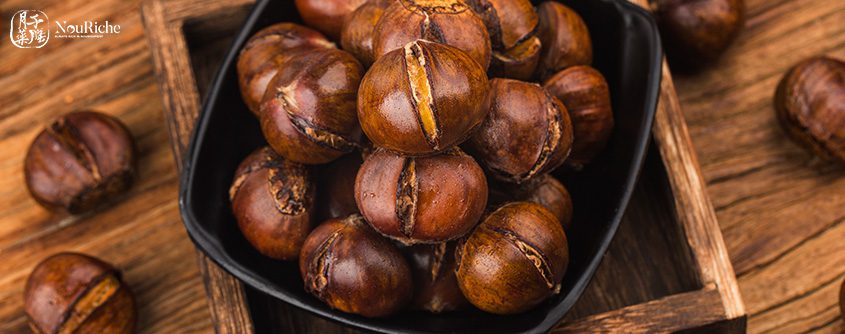
Chestnuts are rich sources of vitamin C which can help to boost the immune system of new mothers. Chestnuts also come with properties that reduce cholesterol levels in the blood and therefore support cardiovascular health.
Red dates
Red dates are often boiled along with Longan and served as tea to new mothers to substitute drinking water. Dates are widely known for their sweet taste. However, they are also vital ingredients in confinement herbal soups because of their calming effects. This is recommended especially for mothers dealing with postpartum depression.
These are but a few of the ingredients used when preparing the best vegetarian confinement foods. That said, it is best to leave your confinement meals in the good hands of those who are trained in this field. If you’re searching for confinement soup packages, look no further than to NouRiche for all your nutritional needs. Get in touch today for more information!
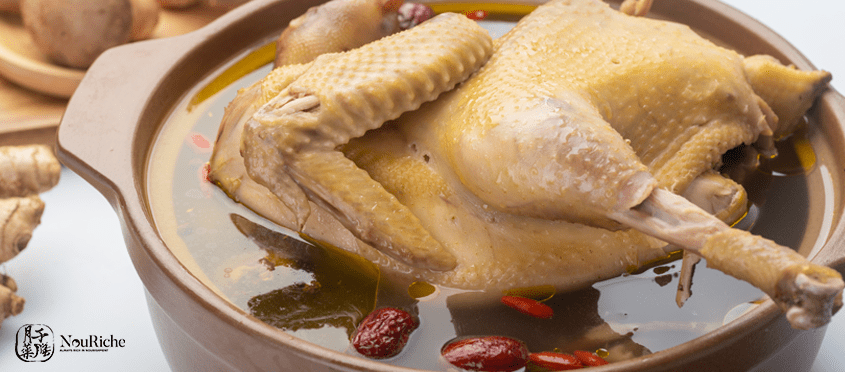
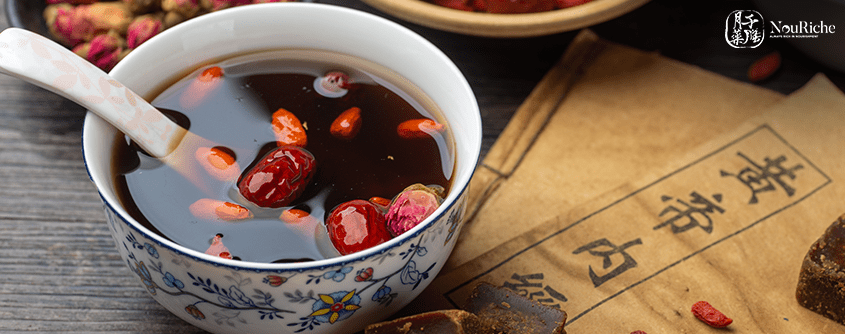
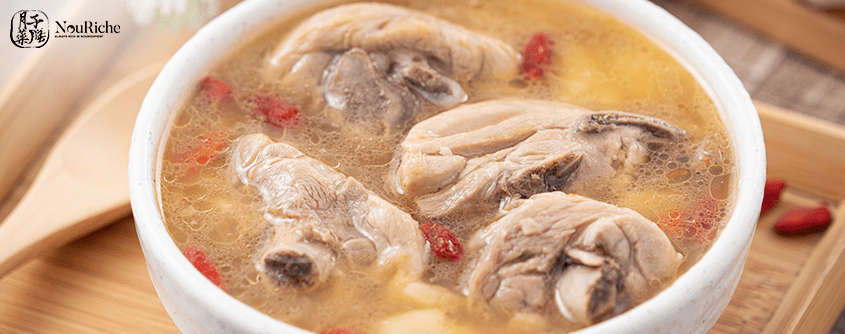
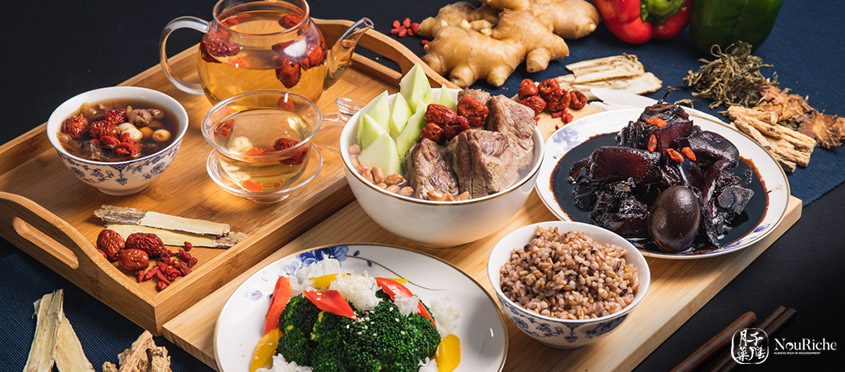
Confinement is a traditional Chinese practice in Singapore that is seen as an extremely important time for new mothers to recuperate their bodies after childbirth. During this period, mothers are advised to observe various routines that will aid their recovery. One of which would be taking in confinement food that are supposed to address the nutritional needs of the mother, with some even designed at boosting milk supply. This allows the new mother to get a much needed immunity boost and a quicker recovery from the delivery of her baby. As such, we’ve listed some recipes that will be helpful for mothers going through their confinement period. Read on to learn more about these recipes that are both healthy, and tasty.
#1 Sesame oil chicken 麻油鸡
Source: https://www.youtube.com/watch?v=kg4jUnio3z8
Sesame oil chicken is a popular confinement food among women during their confinement period. The recipe usually contains sesame oil, ginger and hard liquor because it is believed that “heaty” foods are beneficial for women recuperating from childbirth. While chicken needs no introduction as one of the best sources of protein, it is also able to promote heart health and boosts metabolism. A great source of vitamin E, this recipe is sure to leave you wanting more!
Ingredients
300g chicken
100g black sesame oil
25g red dates
25g wolfberries
100g old ginger
250ml rice wine
A pinch of salt
A pinch of sugar
Directions
Slice old ginger and add into a heated pot
Add in black sesame oil, saute till the edges of the ginger turns brown
Add in chicken
Add salt and sugar
Saute for 5 minutes
Add in rice wine
Add red dates and wolfberries, simmer for 15 minutes
Serve with hot rice
View full recipe here.
#2 Black vinegar pig trotters 猪脚醋
Source : https://youtu.be/qwTXFlvmvM0
A popular Cantonese dish for postnatal mothers during confinement, black vinegar pig’s trotters is a traditional confinement food believed to help replenish collagen, warm the womb and purge “wind” generated during childbirth. The gelatinous pig trotters in sweet black vinegar is a highly appetising and mouth watering dish that is now also commonly seen on the tables of many families.
Ingredients
300g pig trotters
100g old ginger
100g rock sugar
300g black vinegar
10g black sesame oil
2 eggs
Directions
Lightly blanch the pig’s trotters for 3-5 minutes
Wash the foam on the surface and set aside
Boil 2 eggs for 6 minutes, then peel and set aside
Smash large pieces of old ginger
In a heated pot, add in smashed old ginger and rock sugar
Add in black vinegar and saute until aroma is released
Add in blanched pig’s trotters, stir-fry until it has been well coated
Add hard boiled eggs and simmer for 45 minutes
Add in black sesame oil for seasoning
Serve with warm rice
View full recipe here.
#3 Nourishing cordyceps flower with threadfin fish soup 虫草花滋补午鱼汤
Source: https://www.youtube.com/watch?v=KZGQbQVsUTY
Cordyceps flower is a herb that helps to reduce fatigue, boost immunity, and is especially beneficial for a mother’s body after delivery. If you’re searching for nutritious confinement food to boost your stamina, look no further. This soup takes just one hour to simmer on low heat, making it so easy to prepare. A wholesome and nourishing meal best served with hot rice.
Ingredients
20g cordyceps
5g solomonseal rhizome
10g codonopsis root
5g astragalus root
5g dioscorea
3g wolfberry
5g poria
300g threadfish
20g old ginger
2 teaspoon rice wine
A pinch of salt
Directions
Slice old ginger into thin strips.
Lightly blanch the threadfin for 1 minute to remove fishy smells.
Run all herbs under running water gently to remove impurities.
Add washed herbs, rice wine, threadfin and ginger slices into boiling water.
Boil over low heat for an hour.
Add salt to taste.
View full recipe here.
We hope this article has provided you with some inspiration for tasty and nourishing meals during your confinement period. NouRiche understands the importance of good nutrition for new mothers. Browse our extensive confinement food menu, or reach out to learn more about our confinement food delivery services in Singapore today!

Service Hours: 9am to 6pm
Terms and Conditions / Privacy Policy / Copyright © 2024. All rights reserved by RichFood Catering Pte Ltd